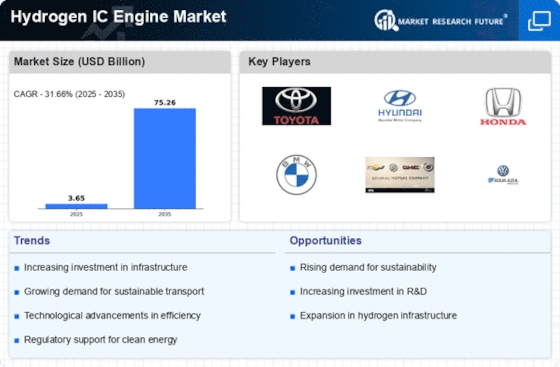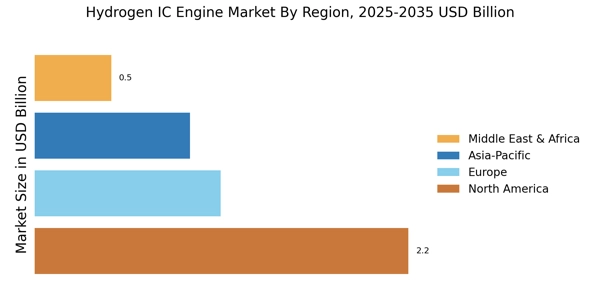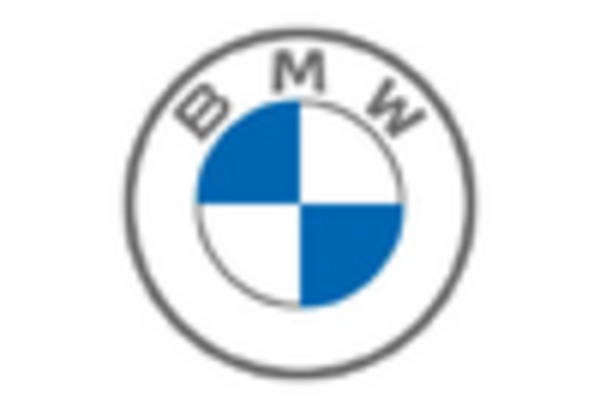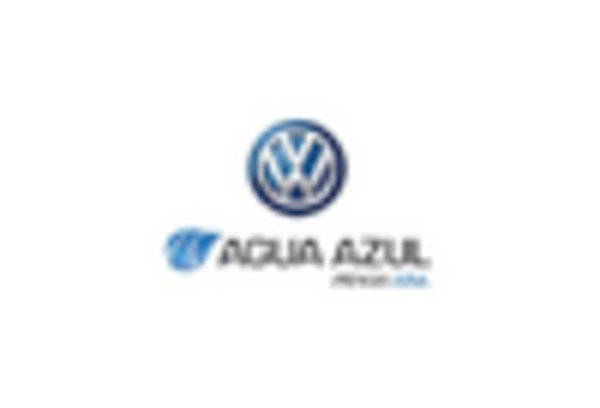Regulatory Frameworks
The Hydrogen IC Engine Market is significantly influenced by supportive regulatory frameworks. Governments worldwide are implementing policies that promote the adoption of hydrogen technologies. Incentives such as tax breaks, subsidies, and grants for research and development are becoming commonplace. For example, the European Union has set ambitious targets for hydrogen adoption, aiming for 10 million tons of renewable hydrogen production by 2030. Such regulatory support not only encourages manufacturers to invest in hydrogen engine technologies but also fosters consumer acceptance. As regulations become more favorable, the Hydrogen IC Engine Market is poised for substantial growth, with projections indicating a compound annual growth rate of over 20% in the coming years.
Technological Innovations
Technological advancements play a pivotal role in the Hydrogen IC Engine Market. Innovations in hydrogen production, storage, and fuel cell technology are enhancing the efficiency and performance of hydrogen engines. For instance, improvements in electrolysis methods are making hydrogen production more cost-effective and sustainable. Additionally, advancements in materials science are leading to lighter and more durable engine components, which can significantly improve vehicle performance. According to recent studies, the efficiency of hydrogen engines is expected to increase by 30% over the next decade, making them more competitive with traditional internal combustion engines. This technological evolution is likely to attract investments and stimulate growth within the Hydrogen IC Engine Market.
Infrastructure Development
Infrastructure development is a crucial driver for the Hydrogen IC Engine Market. The establishment of hydrogen refueling stations and production facilities is essential for the widespread adoption of hydrogen vehicles. Recent initiatives have seen an increase in the number of hydrogen refueling stations, with estimates suggesting that the number could reach 10,000 by 2030. This expansion is vital for alleviating range anxiety among consumers and promoting the use of hydrogen-powered vehicles. Moreover, partnerships between governments and private sectors are facilitating the construction of necessary infrastructure. As the network of hydrogen refueling stations grows, the Hydrogen IC Engine Market is likely to experience accelerated growth, as consumers gain confidence in the availability of hydrogen fuel.
Environmental Sustainability
The Hydrogen IC Engine Market is increasingly driven by the global emphasis on environmental sustainability. As nations strive to reduce greenhouse gas emissions, hydrogen engines present a viable alternative to traditional fossil fuel engines. The combustion of hydrogen produces only water vapor, thus eliminating harmful emissions. This aligns with international climate agreements and national policies aimed at achieving net-zero emissions by 2050. Furthermore, the hydrogen economy is gaining traction, with projections indicating that the hydrogen market could reach USD 2.5 trillion by 2050. This shift towards cleaner technologies is likely to bolster the Hydrogen IC Engine Market, as manufacturers seek to innovate and meet the rising demand for eco-friendly transportation solutions.
Consumer Awareness and Demand
Consumer awareness and demand are emerging as significant drivers in the Hydrogen IC Engine Market. As environmental concerns become more pronounced, consumers are increasingly seeking sustainable transportation options. Surveys indicate that a substantial percentage of consumers are willing to consider hydrogen vehicles, provided that they are competitively priced and readily available. This shift in consumer preferences is prompting manufacturers to invest in hydrogen engine technologies and marketing strategies that highlight the benefits of hydrogen as a clean fuel. Additionally, educational campaigns aimed at informing the public about the advantages of hydrogen vehicles are gaining traction. As awareness grows, the demand for hydrogen-powered vehicles is expected to rise, further propelling the Hydrogen IC Engine Market.

















